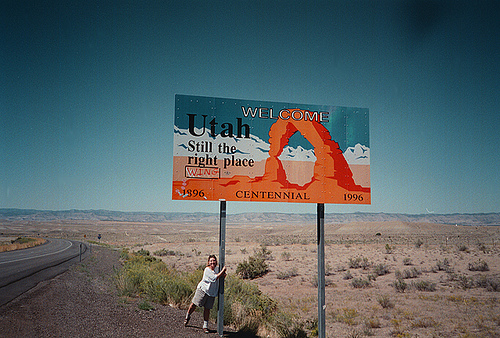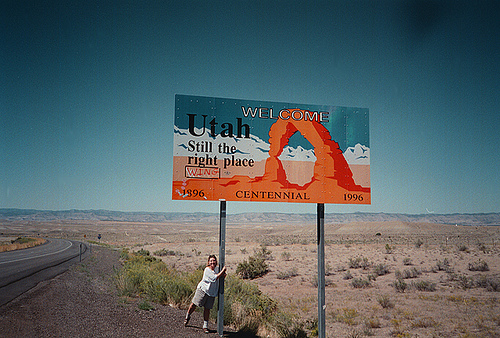This post is reprinted from Climate Progress.
 Utah: still the right wing placeWhen you drive into Utah from Colorado, there’s a sign that says: “Utah: Still the Right Place.” For years, the sign has been edited with red spray paint to read: “Utah, Still the Right Wing.” New word from the Beehive State suggests the grafitti should remain.
Utah: still the right wing placeWhen you drive into Utah from Colorado, there’s a sign that says: “Utah: Still the Right Place.” For years, the sign has been edited with red spray paint to read: “Utah, Still the Right Wing.” New word from the Beehive State suggests the grafitti should remain.
Here’s a report from Tuesday’s Salt Lake Tribune:
[Utah] House OKs resolution doubting climate change
The House adopted a sternly worded resolution declaring the body’s deep skepticism over current climate science and called for the federal government to halt carbon dioxide reduction programs.
Rep. Kerry Gibson said that by pursuing cap-and-trade policies, Washington is engaging on a path that could destroy Utah’s way of life.
“I’m afraid of what could happen to our economy, to our rural life, to our agriculture, if such a detrimental policy continues to be pursued for political reasons,” said the Ogden Republican.
Gibson may not know that one of the most important industries in his state is worried about the consequences of not taking policy action. Park City commissioned a third party science analysis to see what the future held for them without action on climate.
From the report Climate Change in Park City: An Assessment of Climate Snowpack, and Economic Impacts:
Our economic modeling results indicate that projected decreases in snowpack will have severe economic consequences for the region. By 2030, the estimated decrease in snowpack is estimated to result in $120.0 million in lost output. This lost output is estimated to result in an estimated 1,137 lost jobs and $20.4 million in the form of lost earnings (or labor income). By 2050, the potential impacts range from $160.4 million in lost output, $27.2 million in lost earnings, and 1,520 lost jobs (low emissions scenarios) to $392.3 million in lost output, $66.6 million in lost earnings, and 3,717 lost jobs (high emissions scenario).
More for Gibson: here’s what’s going to happen to agriculture, another of his concerns, without action on climate. (From the report Hotter and Drier: The West’s Changed Climate [PDF], another science meta-study):
In Utah, ongoing drought has qualified most of the state for disaster relief during several years. In the summer of 2007, the U.S. Dept. of Agriculture declared 24 of 29 Utah counties primary disaster areas due to drought, wildfire, and flash floods. In 2003, the USDA declared all 29 counties primary disaster areas due to drought, insect infestation, and high winds. In 2002, the amount of non-irrigated farm lands that were harvest fell by more than 30 percent, compared to 1997.
Being a desert, this deeply religious state is probably going to suffer more than others as the planet warms. But “where there is no vision,” as the Proverbs say, “the people perish.”
No people deserve the climate fate in store for Utah. But their leaders “have sown the wind, and they shall reap the whirlwind: it hath no stalk; the bud shall yield no meal” (Hosea, 8:7). Unless they are careful, Utah’s leaders may end up ensuring biblical calamity for their good citizens.



